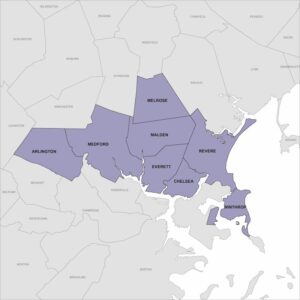Who is a member?
Our members are the local governments of Massachusetts and their elected and appointed leadership.
Mass Innovations, From The Beacon, April 2024

A new program will bring more service coordination to address homelessness and housing insecurity in eight communities. (Map courtesy city of Malden)
As the state grapples with a housing supply and affordability crisis, eight communities just outside of Boston are launching a regional program in April to address homelessness and housing insecurity.
Led by Malden, the eight-community collaborative has engaged a local nonprofit to provide more comprehensive services to people who are already homeless, people who are facing homelessness, and people experiencing housing challenges related to domestic violence. The initiative also involves Arlington, Chelsea, Everett, Medford, Melrose, Revere and Winthrop.
The regional program has been at least a year in the making, and stems from a desire to address homelessness and housing insecurity more proactively, and from a realization that the problems are too big for any one community to tackle on its own.
“None of our cities would be able to provide these services on our own,” said Malden Mayor Gary Christenson, who announced the initiative last month during his annual State of the City address. “Only together can we respond with the care, compassion and capacity that these most vulnerable residents need.”
The municipalities previously lacked the capacity to send caseworkers into the community to serve people in need, said Alex Pratt, Malden’s deputy director of housing and community development.
To address the demand for more outreach and support services, Malden and its neighbors tapped into an existing mechanism, Pratt said. For more than three decades, the eight communities have participated in the North Suburban Consortium through the U.S. Department of Housing and Urban Development’s HOME Investment Partnerships Program, he said. The municipalities have jointly applied for, received and administered affordable housing development funds for years, he said. So it made sense to approach homelessness collectively as well.
“Homelessness doesn’t recognize municipal borders,” Pratt said. “Someone who slept in Malden last night counts, for all housing purposes, as a Malden resident. But if they sleep tomorrow night in Medford, am I not going to serve them?
“I think the old school way of doing things runs the risk of being too parochial and saying, ‘Oh well, that’s not my problem, that’s somebody else’s problem.’ We leave a lot of people out on the street, I think, when we do that.”
To fund the program over the next four years, the communities will use $1.8 million out of the nearly $7.3 million in federal funding they received through the HOME Investment Partnerships American Rescue Plan Program. Most of the remaining HOME-ARP funds will fund the development of affordable rental housing, Pratt said.
With Massachusetts seeing some of the nation’s highest housing prices, the state faces a significant issue with homelessness. According to a December 2023 HUD report, the state had 19,141 homeless individuals as of January 2023, and experienced the fifth-highest jump in the number of homeless people from 2022 to 2023, a 23.4% increase.
“No one should be questioning where they will be sleeping at night,” Medford Mayor Breanna Lungo-Koehn said in a statement about the program. “Yet too many people throughout our region are forced into this situation regularly.”
The problems with homelessness and housing insecurity predate the current migrant crisis, Pratt said, and have been building for decades due to limited housing supply and the lack of investment in affordable housing.
“I think whether it was going to be a migrant crisis or some other challenge, we were going to see a need for these services,” Pratt said. “And these types of services will be needed for a long time, until we build the housing that our communities need.”
Malden’s Office of Strategic Planning and Community Development will oversee the program. To deliver the services, the consortium has hired the Malden-based nonprofit Housing Families, which expects to subcontract with another nonprofit, The Neighborhood Developers, from Chelsea. Pratt said the program plans to have a program manager, a couple of case workers, a clinician and a van.
The program will provide everything from food and water to case management and housing problem-solving to help transition people into stable housing. The nonprofit will be able to assist vulnerable people in a way that municipalities can’t, Pratt said, with issues including mental illness or addiction. He said the nonprofit can also serve numerous language needs.
Pratt said the program is conducting outreach so that when community-based organizations and municipal offices encounter people in need, “they know to call us.”
For more information about the homelessness program, contact Alex Pratt at [email protected].